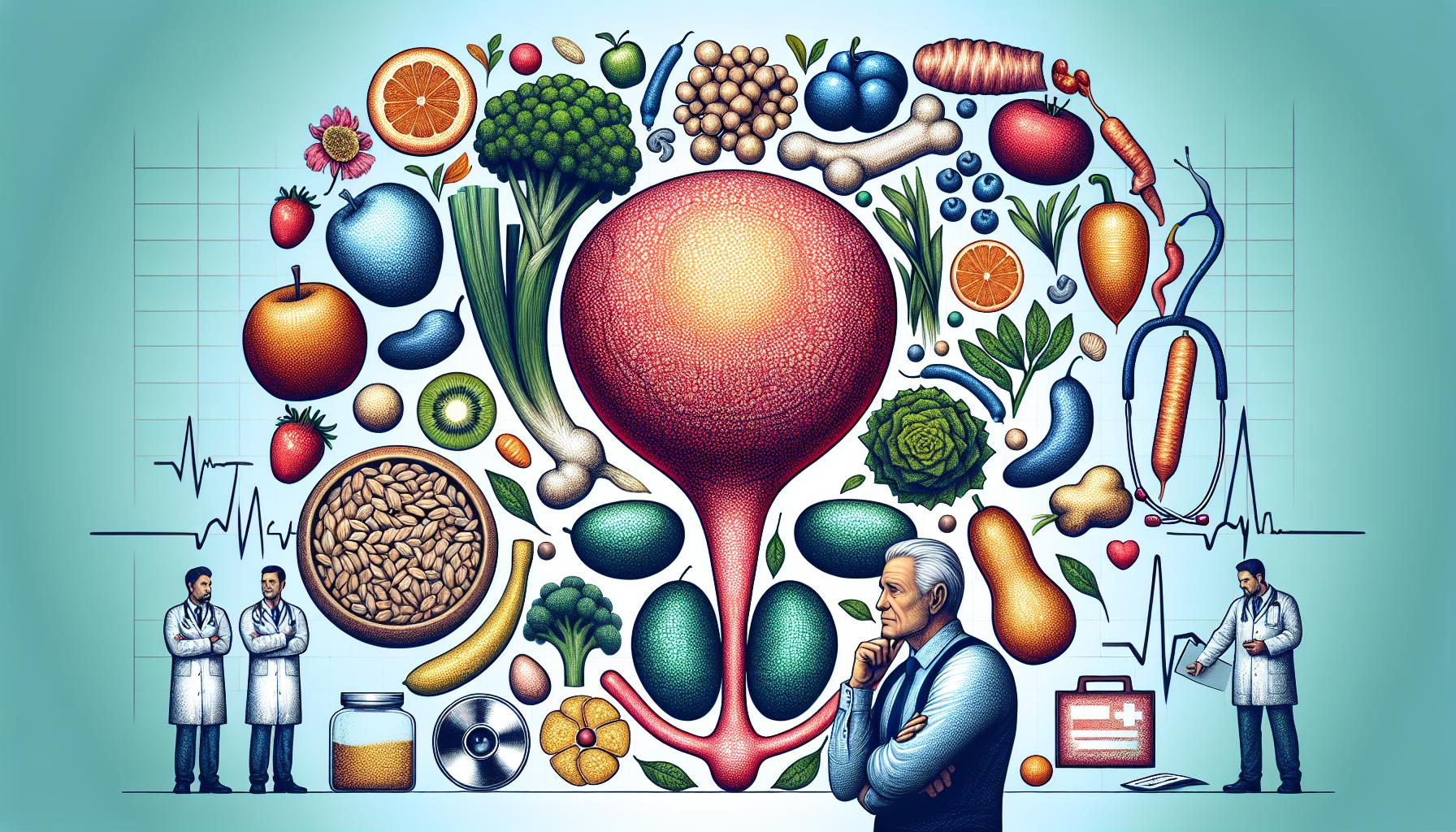Introduction: Navigating the Nutritional Needs in the Battle Against Prostate Cancer
In the ever-pressing struggle against disease, particularly that of advanced prostate cancer, what role does your food choices play? Simply put, the food you consume can be a pivotal player in your proactive punch against prostate cancer. Nutrition isn’t a magic bullet to obliterate the disease, but it can support your body’s defenses and potentially slow the cancer’s progression. This article will navigate the nutritional needs associated with advanced prostate cancer, providing a diet guide with an emphasis on preventative measures, reduction of symptoms, and enhancement of overall wellbeing.
The Cornerstone of a Cancer-Combating Diet: Serving Size and Selection
It’s not enough to merely cherry-pick certain foods. The keystone to constructing a powerful prostate-cancer-fighting diet rests on two pillars: portion control, and balance in food choices. As tempting as it is to over-indulge in hearty portions, meticulous management of serving sizes can go a long way. Try to maintain a body weight that’s healthy and stable by being mindful of calorie intake. For the sake of variety and to ensure a full spectrum of nutrients, keep your consumption colorful by incorporating a broad range of fruits, vegetables, lean proteins, and whole grains.
A Closer Look into Phytochemicals
Beyond the immediate flavor and enjoyable crunch, fruits and vegetables are also loaded with phytochemicals – naturally-occurring compounds with cancer-combating potential. From the fiery red lycopene in tomatoes to the potent resveratrol in purple grapes, these compounds deliver a one-two punch against prostate cancer.
The Prostate Cancer Diet: A Kaleidoscope of Color
In your dietary arsenal against prostate cancer, consider the colorful cornucopia of fruits and vegetables as your secret weapons. Red foods like tomatoes, bell peppers, and berries are rich in potent antioxidants. Oranges, tangerines, and carrots, along with other orange and yellow foods, are packed with Vitamin C and carotenoids. For the dark green warriors, think spinach, broccoli, and brussel sprouts with their rich store of essential vitamins, minerals, and fiber.
Not Just Rabbit Food: Incorporating Lean Proteins and Whole Grains
Don’t be misled into thinking a cancer-battling diet is wholly vegetarian. Lean proteins like chicken breast, turkey, fish, or plant-based alternatives like beans and tofu make welcome additions. Whole grains,–like brown rice, quinoa, and whole wheat bread–offer a bounty of fiber and essential nutrients.
Cutting the Junk: Foods to Avoid
Just as significant as what you should eat is what you may have to forfeit. The sinfully sweet, the salty, and the overly processed foods often beloved for their convenience, are generally low on nutrition, high in calories and may even promote inflammation and cancer growth.
A Word on Processed Meats
Processed meats like sausages, hot dogs, and bacon are alluring with their sizzle and aroma. Yet, the frequent consumption of these is considered a risk factor for prostate cancer. Swapping them out for lean proteins isn’t just a trade; it’s an upgrade for your health.
A Toast to Hydration and Moderation
Remember: hydration is imperative! Plenty of water, coupled with occasional herbal teas and fresh fruit juices can keep dehydration at bay. And although alcohol can be part of a balanced diet, moderation is key — limit yourself to no more than two drinks a day.
Dietary Decisions: Shaping Your Plate and Fate
Diet, indeed, can play a key role in the fight against prostate cancer. But remember, it’s one strategy in a multi-faceted approach that includes regular physical activity, stress management, and medical care as advised by your healthcare professional.
Conclusion: The Advanced Prostate Cancer Diet Guide
Creating an eating plan to thwart prostate cancer isn’t about a short-term diet, rather it’s about long-term, sustainable changes that favor healthier choices. Every meal is an opportunity to strengthen your body’s defenses. From the rainbowed array of fruits and vegetables to lean proteins, whole grains and adequate hydration — joined with the wise omission of processed and unhealthy foods, you can make strides in battling advanced prostate cancer. With each mindful choice, you are actively contributing to your wellbeing.
Frequently Asked Questions
1. Can diet prevent prostate cancer?
A healthy diet can’t guarantee prevention of prostate cancer, but it could reduce risk. Eating more fruits, vegetables, lean proteins and whole grains while limiting processed meats and junk food contribute to overall health and cancer risk reduction.
2. Does eating red meat cause prostate cancer?
While no conclusive evidence directly links red meat to prostate cancer, observational studies suggest a higher risk with increased consumption, particularly of processed and charred red meats.
3. Can prostate cancer patients consume dairy?
In moderation, dairy products can be part of a balanced diet. However, excessive consumption may raise prostate cancer risk. Opt for low-fat dairy choices when possible.
4. Can fruits lower my risk of prostate cancer?
Fruits are rich in vitamins, fiber, and antioxidants which are beneficial for overall health. They may not directly lower the risk but contribute to a healthy dietary pattern, which in turn could reduce prostate cancer risk.
5. How can I manage my weight during prostate cancer treatment?
Maintaining a healthy weight involves balancing diet and physical activity. A balanced diet rich in fruits, vegetables, lean proteins, and whole grains, with appropriate portion control, helps maintain a stable weight. Regular physical activity as permitted by your healthcare professional complements this.


